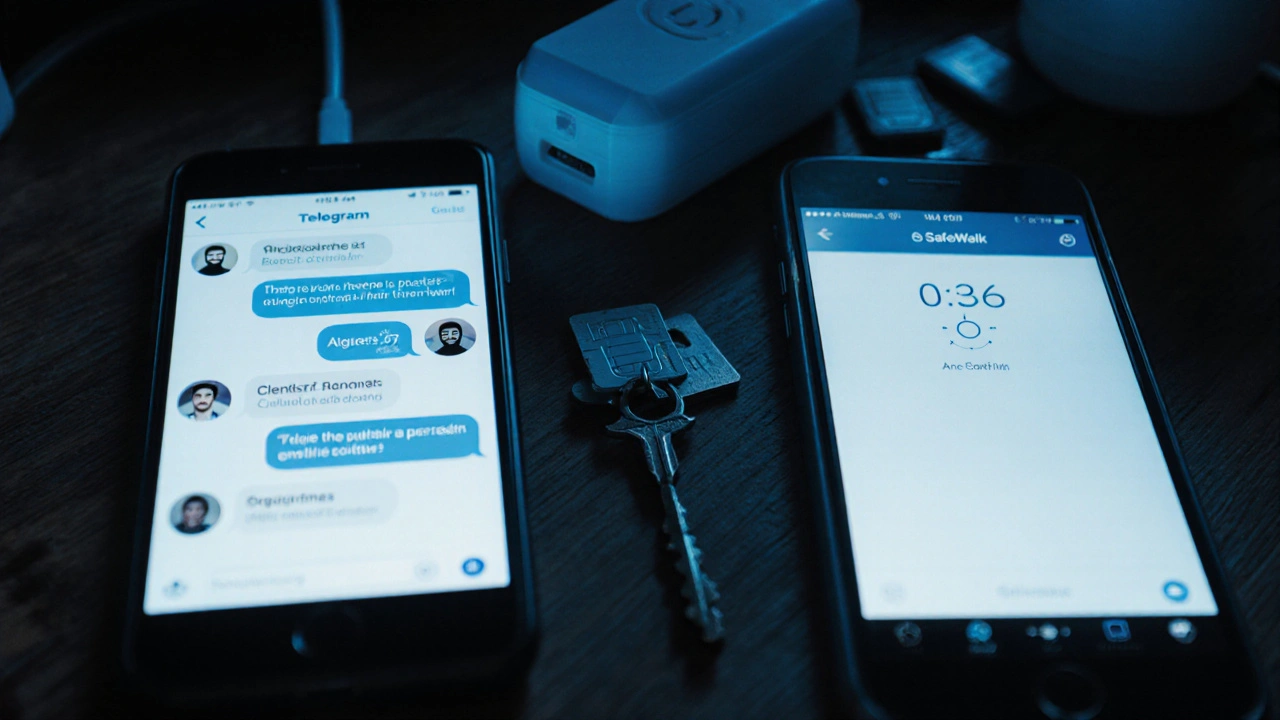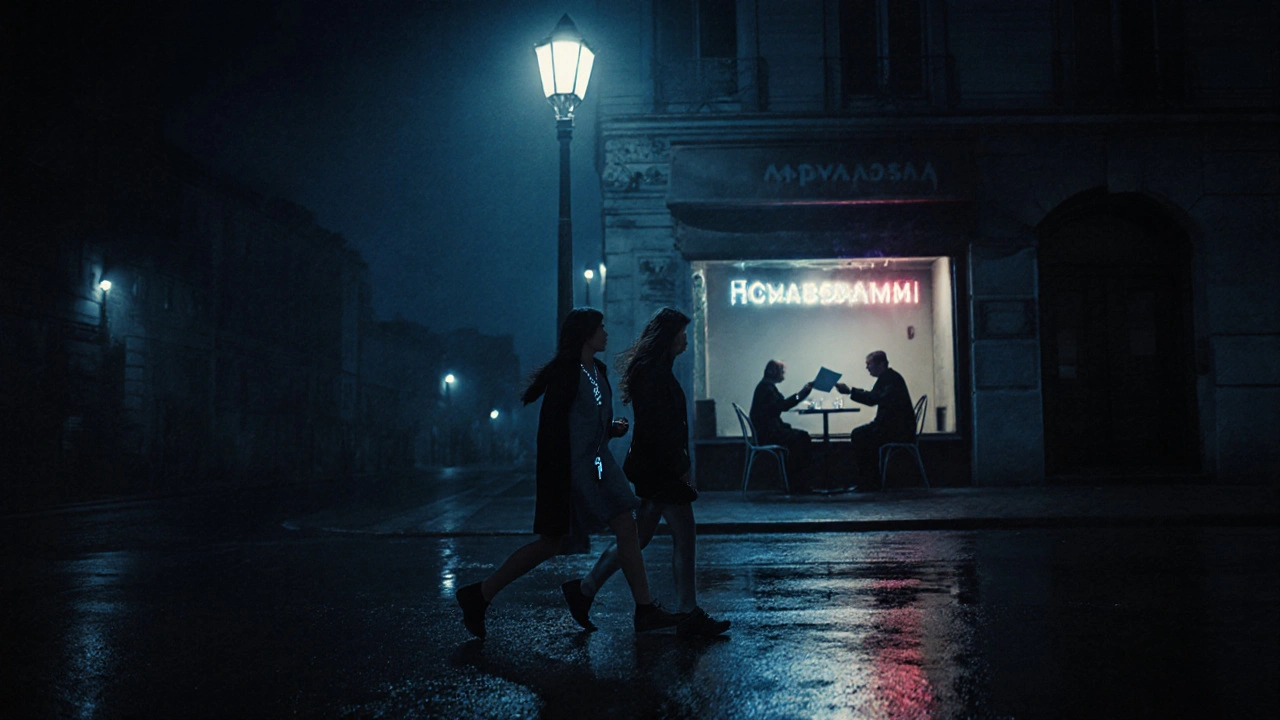Doing adult work in Moscow isn’t just about showing up for appointments. It’s about surviving a system that doesn’t protect you, where language barriers, legal gray zones, and isolation can turn a job into a daily risk. You’re not alone-but you have to build your own safety net. No government agency, no employer, no platform will do it for you. The people who make it through long-term are the ones who found their tribe.
Start with the People Who’ve Been There
You don’t need a formal group or a nonprofit to build support. You need real people who understand the rhythm of your days-the late-night cancellations, the clients who push boundaries, the fear of being reported. In Moscow, many sex workers connect through private Telegram channels. These aren’t public forums. They’re invite-only, encrypted, and quiet. One woman I spoke with said she joined after a client stole her phone and threatened to post her photos. She found three others in the same situation. They started sharing client names, warning each other about police stings, and even splitting the cost of a translator for legal paperwork.Don’t wait for someone to reach out. If you’re new in Moscow, ask someone you trust: "Do you know anyone else who’s been doing this for more than a year?" That’s how most networks begin. One person introduces you to another. No names exchanged at first. Just a simple message: "Need to talk about a bad client. Can we meet?"
Learn the Local Rules Before You Break Them
Moscow’s laws around adult work are vague. Prostitution itself isn’t illegal, but soliciting, running a brothel, or advertising is. That means you’re always operating in the shadows. The people who stay safe know the unwritten rules:- Never meet a client in your apartment on the first date.
- Always tell someone where you’re going and when you’ll be back.
- Use a burner phone with a local SIM-no personal number tied to your ID.
- Keep your cash separate from your bank account. Don’t deposit payments from clients.
- Don’t use your real name on any platform, even if it’s "private".
These aren’t just tips. They’re survival tactics. One woman in her late 30s told me she lost two friends in two years-not because of violence, but because they used their real photos online. A client traced them to their home address. One was robbed. The other disappeared. No one reported it. No one could.
Find a Safe Space-Even If It’s Just a Coffee Shop
Loneliness kills faster than bad clients. Many workers in Moscow don’t have friends outside the job. Family cut ties. Roommates don’t understand. The loneliness builds until you start taking risks just to feel seen.There’s a small coffee shop near Krasnaya Presnya that’s become a quiet hub. It’s not advertised. Workers go there between appointments. No one talks about work unless someone brings it up. But if you say, "I’m new here," someone will slide you a napkin with a number written on it. Sometimes it’s a translator. Sometimes it’s a nurse who gives free STI tests on Saturdays. Sometimes it’s just someone who says, "I’ve been there. Want to walk to the metro together?"
You don’t need a support group. You need one person who won’t judge you for being tired. Who won’t ask why you’re doing this. Who just says, "Here’s my number. Call me if you need help."

Use Technology, But Don’t Trust It
Apps like Telegram, Signal, and even WhatsApp are lifelines. But they’re also traps. One worker used a group chat to share client names. Someone leaked the list. Five women were targeted by the same man who’d been stalking them for months. He used the names to find their addresses.Here’s what works:
- Use separate phones for work and personal life.
- Never save client names or numbers in your main phone.
- Use a password manager with a fake name for your profiles.
- Turn off location services on all apps.
- Don’t post photos of your apartment, car, or street.
There’s a tool called "SafeWalk"-a free app made by a group of Russian activists. It lets you set a timer. If you don’t cancel it before your appointment ends, it sends your location and a pre-written message to three contacts. No one knows you’re using it unless you tell them. It saved one woman’s life last year when a client tried to lock her in his car.
Know When to Walk Away
You don’t have to take every client. You don’t have to say yes to every request. But saying no is harder when you’re alone and scared of losing income.Build a list of red flags-and stick to it. Here’s what real workers in Moscow watch for:
- Client refuses to show ID or uses a fake name.
- Asks to go somewhere remote or unfamiliar.
- Wants to film without consent.
- Offers way more than market rate-this is often a trap.
- Shows up early or without notice.
- Pressures you to do something you said no to before.
One woman told me she once turned down a client who offered 20,000 rubles for an hour. She didn’t know why. Later, she found out he’d assaulted two other workers in the same building. She didn’t get paid. But she didn’t end up in the hospital either.

Connect With People Outside the Industry
Your support network shouldn’t only be other workers. You need people who don’t know what you do. People who see you as more than your job. A language tutor. A yoga instructor. A volunteer at the animal shelter. Someone who asks how your day was without expecting a story about clients.One worker in Moscow started taking free Russian lessons at a community center. She didn’t tell anyone why she was there. But over time, she made friends. One of them helped her fill out paperwork for a temporary residence permit. Another lent her a book on mental health. These connections didn’t pay her rent. But they reminded her she was still human.
What to Do If Something Goes Wrong
If you’re robbed, threatened, or assaulted, your first instinct might be to stay quiet. That’s normal. But silence is dangerous. Here’s what to do instead:- Call someone from your network immediately. Don’t wait.
- Write down everything: time, location, what happened, what the person looked like.
- Take a photo of any damage or injuries-don’t delete it.
- Don’t confront the person. Don’t try to get your money back.
- Reach out to a trusted contact who can help you report it anonymously, if needed.
There’s a small NGO in Moscow called "Open Door" that helps sex workers. They don’t ask for ID. They don’t report you to police. They offer legal advice, safe housing, and medical care. You can find them through word of mouth. Ask someone you trust: "Do you know anyone who’s been helped by Open Door?"
You’re Not Alone, Even When It Feels Like It
Building a support network while doing adult work in Moscow isn’t glamorous. There are no posters. No hashtags. No viral stories. It’s quiet. It’s risky. It’s done in whispers and encrypted messages and coffee shop meetups.But it works.
Every woman who’s been doing this for more than a year has a story like this: "I didn’t have anyone at first. Then I met one person. Then another. Now I know six people I can call at 3 a.m. and they’ll answer. That’s enough."
You don’t need a big network. You just need one person who knows your name, your face, and your limits. And you need to be that person for someone else.
Is it safe to meet clients alone in Moscow?
Meeting clients alone increases your risk. Many workers in Moscow use a safety system: always tell someone where you’re going, use a burner phone, and never go to a client’s place on the first meeting. Some use SafeWalk, a free app that alerts contacts if you don’t check in. Never skip these steps-even if you think the client is "nice."
Can I use my real name on AdultWork Moscow?
Never use your real name, photo, or personal details on any platform, including AdultWork. Many workers have been targeted after clients traced their profiles to their homes or workplaces. Use a pseudonym, fake photos, and a separate email. Your safety depends on staying anonymous.
How do I find other sex workers in Moscow for support?
Start by asking someone you trust: "Do you know anyone else who’s been doing this for over a year?" Most networks form through private Telegram groups or quiet meetups in places like coffee shops near Krasnaya Presnya. Don’t post publicly. Don’t use your real name. Let connections build slowly and safely.
What should I do if a client threatens me?
Get to a safe place immediately. Call someone from your support network. Write down everything: time, location, what was said, what the person looked like. Don’t try to handle it alone. Reach out to organizations like Open Door-they offer anonymous help, legal advice, and safe housing. You don’t need to report to police to get help.
Are there health services for sex workers in Moscow?
Yes. Organizations like Open Door offer free STI testing, condoms, and basic medical care without asking for ID or reporting you. Some nurses work on weekends specifically for workers. You can find them through trusted contacts. Regular check-ups are not optional-they’re part of staying alive.
How do I avoid being scammed by fake clients?
Watch for red flags: clients who offer way more than market rate, refuse to show ID, want to go to remote locations, or pressure you to do something you said no to. Always meet in public first. Use a burner phone. Never give out your real address. If something feels off, walk away. It’s better to lose a payment than your safety.
If you’re new to Moscow, start small. Find one person you can trust. Learn the local rules. Protect your identity. Use tools like SafeWalk. And remember: you don’t have to do this alone. The network is already there-you just have to reach out.

